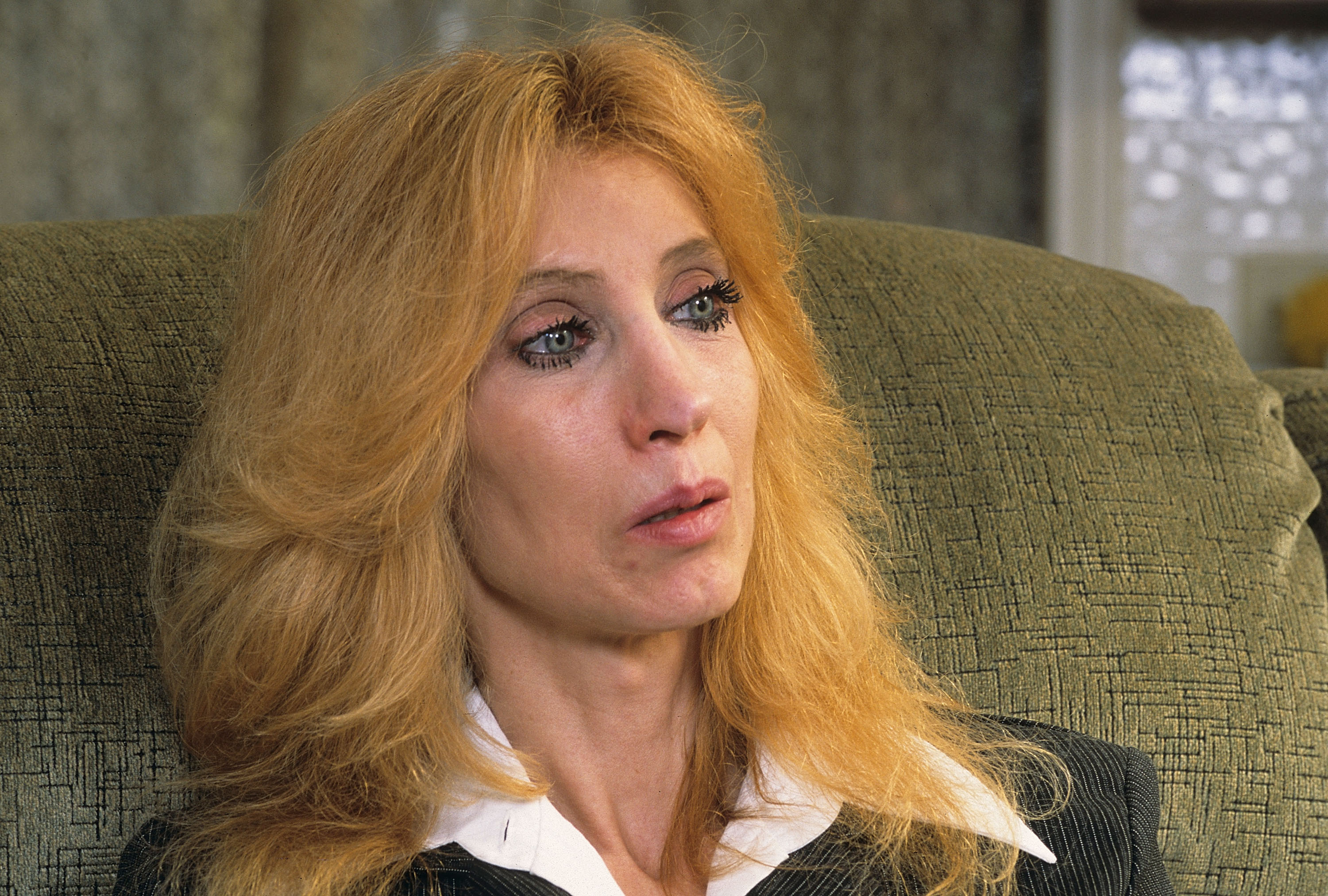Between the late ’90s and mid-’00s, Eminem’s rocky relationship with his mother became a focal point in his career. Over time, their personal struggles and public disputes drew intense scrutiny to Debbie’s life, hurting her deeply.
In the 1970s, Debbie Nelson faced an unimaginable ordeal during the birth of her son, Marshall Mathers, better known as Eminem. She suffered from blood poisoning and endured an extended labor.

Debbie Nelson holding a bible in 2005 | Source: Getty Images
Adding to her struggles, Debbie was left to raise her son alone. Life as a young, single mother proved difficult, setting the stage for years of financial hardship and emotional tension between her and Eminem.

Debbie’s Traumatic Labor and Life as a Young Mother
Debbie was just 18 years old when she became pregnant with her first child, Eminem. Complications arose during her pregnancy, culminating in a grueling 72-hour labor. Medical records later revealed she suffered from toxicoma blood poisoning, a condition that nearly took her life.

Debbie Nelson during a portrait session in 2005 | Source: Getty Images
After giving birth, Debbie slipped into a coma and remained unconscious for several days. When she awoke, she faced the harsh reality of raising her child alone. Eminem’s father left shortly after his birth, leaving Debbie to take on the responsibilities of a single parent.

Their life together was not easy. Debbie and her infant son moved frequently, shuttling between Kansas City and Detroit, rarely settling in one place for long. Financial difficulties were a constant, with the pair often living in less-than-ideal conditions.
Debbie had to take on various jobs to support her family. When Eminem made it big as a rapper, most of his lyrics were narrations of his childhood. He often recalled a difficult upbringing, mentioning being bullied in school and lacking a stable home environment.

Debbie Nelson poses for a portrait in September 2005 | Source: Getty Images
Public Feuds and Legal Battles
Through his songs, Eminem brought his strained relationship with Debbie into the spotlight. In his early music, he accused her of neglect, substance abuse, and poor parenting. Songs like “Cleanin’ Out My Closet” and “Kill You” contained harsh criticisms and explicit lyrics directed at her.

These public grievances turned their personal conflicts into a national spectacle. Debbie responded by filing an $10 million defamation lawsuit against Eminem in 1999. She claimed his accusations were false and had damaged her reputation.

Debbie Nelson outside her house in 2005 | Source: Getty Images
The case was ultimately settled in 2001, with Debbie receiving $25,000. However, after legal fees, she walked away with just $1,600. Eminem’s lyrics continued to draw attention, often portraying Debbie in a negative light.

Eminem accepts an award on February 26, 2001 | Source: Getty Images
Debbie’s Struggles and The Toll of Her Son’s Fame
The fallout from Eminem’s public accusations took a significant toll on Debbie’s life. Fans of the rapper, influenced by his lyrics, often treated her with disdain. Debbie shared that she was often harassed in public, with strangers spitting on her and calling her derogatory names.

Debbie Nelson during a portrait session in 2005 | Source: Getty Images
“It’s sad because people are passing judgment by listening to Marshall’s songs,” she said, adding that his music had made her a pariah in the eyes of many. In an effort to defend herself, Debbie released a CD titled “Set the Record Straight.”

Debbie Nelson released an album, “Set The Record Straight” in 2000 | Source: Getty Images
The album, which featured her rapping, directly addressed Eminem and his accusations. One track included the plea, “Will the real Marshall Mathers please stand up and take responsibility for his actions.” Despite her attempts to tell her side of the story, the damage to her reputation lingered.

Debbie Nelson poses outside her house in 2005 | Source: Getty Images
Debbie also disputed Eminem’s portrayal of his childhood, insisting he had been “spoiled rotten” and that she often went to great lengths to provide for him. “Anything he wanted, I made sure I’d take my last dime and get it for him,” she asserted.

Debbie Nelson in 2005 | Source: Getty Images
She also released a memoir, “My Son Marshall, My Son Eminem,” in 2007. The book presented her perspective, challenging Eminem’s portrayal of their family life and wanting to remind him of the good times. Debbie’s efforts to reconcile their differences were often overshadowed by the narrative cemented in Eminem’s music.








